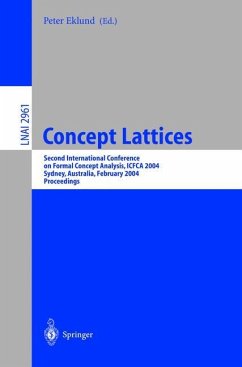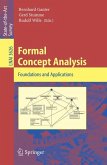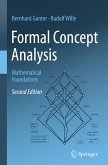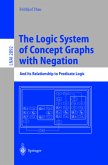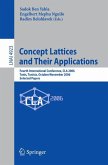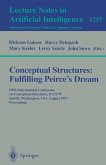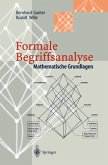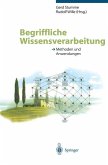This book constitutes the refereed proceedings of the Second International Conference on Formal Concept Analysis, ICFCA 2004, held in Sydney, Australia in February 2004.
The 27 revised full papers presented together with 7 invited papers were carefully reviewed and selected for inclusion in the book. Formal concept analysis emerged out of efforts to restructure lattice theory and has been extended into attribute exploration, Boolean judgment, and contextual logics in order to create a powerful general framework for knowledge representation and formal reasoning; among the application areas of formal concept analysis are data and knowledge processing, data visualization, information retrieval, machine learning, data analysis, and knowledge management. The papers in this book address all current issues in formal concept analysis, ranging from foundational and methodological issues to applications in various fields.
This volume contains the Proceedings of ICFCA 2004, the 2nd International Conference on Formal Concept Analysis. The ICFCA conference series aims to be the premier forum for the publication of advances in applied lattice and order theory and in particular scienti?c advances related to formal concept analysis. Formal concept analysis emerged in the 1980s from e?orts to restructure lattice theory to promote better communication between lattice theorists and potentialusersoflatticetheory.Sincethen,the?eldhasdevelopedintoagrowing research area in its own right with a thriving theoretical community and an increasing number of applications in data and knowledge processing including data visualization, information retrieval, machine learning, data analysis and knowledge management. In terms of theory, formal concept analysis has been extended into attribute exploration, Boolean judgment, contextual logic and so on to create a powerful general framework for knowledge representation and reasoning. This conference aims to unify theoretical and applied practitioners who use formal concept an- ysis, drawing on the ?elds of mathematics, computer and library sciences and software engineering. The theme of the 2004 conference was 'Concept Lattices" to acknowledge the colloquial term used for the line diagrams that appear in almost every paper in this volume. ICFCA 2004 included tutorial sessions, demonstrating the practical bene?ts of formal concept analysis, and highlighted developments in the foundational theory and standards. The conference showcased the increasing variety of formal concept analysis software and included eight invited lectures from distinguished speakersinthe?eld.Sevenoftheeightinvitedspeakerssubmittedaccompanying papers and these were reviewed andappear in this volume.
Hinweis: Dieser Artikel kann nur an eine deutsche Lieferadresse ausgeliefert werden.
The 27 revised full papers presented together with 7 invited papers were carefully reviewed and selected for inclusion in the book. Formal concept analysis emerged out of efforts to restructure lattice theory and has been extended into attribute exploration, Boolean judgment, and contextual logics in order to create a powerful general framework for knowledge representation and formal reasoning; among the application areas of formal concept analysis are data and knowledge processing, data visualization, information retrieval, machine learning, data analysis, and knowledge management. The papers in this book address all current issues in formal concept analysis, ranging from foundational and methodological issues to applications in various fields.
This volume contains the Proceedings of ICFCA 2004, the 2nd International Conference on Formal Concept Analysis. The ICFCA conference series aims to be the premier forum for the publication of advances in applied lattice and order theory and in particular scienti?c advances related to formal concept analysis. Formal concept analysis emerged in the 1980s from e?orts to restructure lattice theory to promote better communication between lattice theorists and potentialusersoflatticetheory.Sincethen,the?eldhasdevelopedintoagrowing research area in its own right with a thriving theoretical community and an increasing number of applications in data and knowledge processing including data visualization, information retrieval, machine learning, data analysis and knowledge management. In terms of theory, formal concept analysis has been extended into attribute exploration, Boolean judgment, contextual logic and so on to create a powerful general framework for knowledge representation and reasoning. This conference aims to unify theoretical and applied practitioners who use formal concept an- ysis, drawing on the ?elds of mathematics, computer and library sciences and software engineering. The theme of the 2004 conference was 'Concept Lattices" to acknowledge the colloquial term used for the line diagrams that appear in almost every paper in this volume. ICFCA 2004 included tutorial sessions, demonstrating the practical bene?ts of formal concept analysis, and highlighted developments in the foundational theory and standards. The conference showcased the increasing variety of formal concept analysis software and included eight invited lectures from distinguished speakersinthe?eld.Sevenoftheeightinvitedspeakerssubmittedaccompanying papers and these were reviewed andappear in this volume.
Hinweis: Dieser Artikel kann nur an eine deutsche Lieferadresse ausgeliefert werden.

